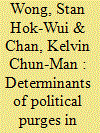| Srl | Item |
| 1 |
ID:
178733


|
|
|
|
|
| Summary/Abstract |
Why would dictators purge members of their ruling coalition? Some argue that doing so can minimize the risk to dictators’ political survival, while others contend that dictators who mount purges are motivated by the desire to share resources with fewer allies. In this study, we analyze an original dataset, compiled from biographical data on the subordinates of the founding emperors of seven ancient Chinese imperial dynasties. Analyzing the data with competing risks models, we find that military experience is a strong predictor of political purges. Emperors were less likely to execute officers who had fought in more battles, but more likely to execute commanders, especially those who had established military credentials prior to the founding of an empire. In addition, the incidence of political purges heightened toward the end of an emperor’s life, which implies that the founding emperors were concerned about the security threats against their designated successors. Potential challengers came not only from the military, but also from the aristocracy. Indeed, we find that the blood relatives of the emperors were more likely to experience a mild form of purges: deprivation of titles. These findings suggest that dictators are more likely to use purges to reduce existential threats.
|
|
|
|
|
|
|
|
|
|
|
|
|
|
|
|
| 2 |
ID:
181401


|
|
|
|
|
| Summary/Abstract |
Scholars of electoral autocracies accord far more attention to post-election protests than pre-election ones, as the former have the potential to trigger a regime transition. We argue that pre-election protests can have a significant effect on election outcomes. In particular, they are likely to deepen social cleavages along two dimensions: age and immigrant status. The 2019 social unrest in Hong Kong provides a unique opportunity to evaluate the electoral impact of pre-election protests. Comparing public opinion data related to the 2019 and 2015 District Council elections, we find strong empirical support for our argument, as immigrant status and age are strong predictors of voting choices and voter turnout. Our findings imply that exposure to democratic protests may not help in bridging the gap in political attitudes between immigrants and natives.
|
|
|
|
|
|
|
|
|
|
|
|
|
|
|
|